中考英语专项训练 特殊句式(祈使句倒装句反意疑问句)(word版无答案)
- 格式:docx
- 大小:17.97 KB
- 文档页数:5
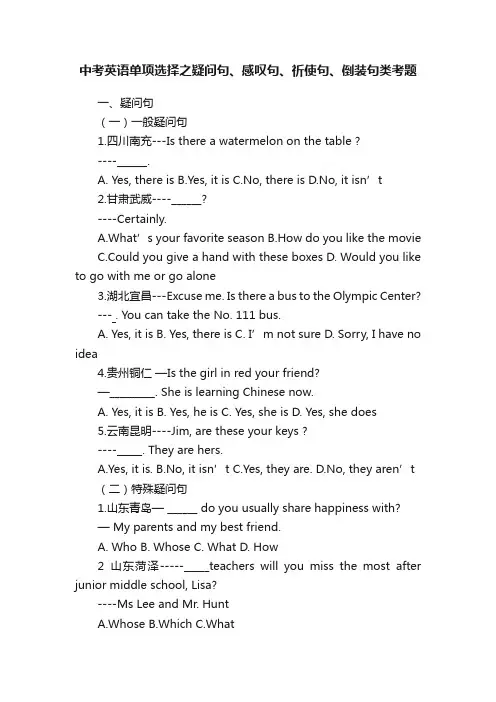
中考英语单项选择之疑问句、感叹句、祈使句、倒装句类考题一、疑问句(一)一般疑问句1.四川南充---Is there a watermelon on the table ?----______.A. Yes, there isB.Yes, it isC.No, there isD.No, it isn’t2.甘肃武威----______?----Certainly.A.What’s your favorite seasonB.How do you like the movieC.Could you give a hand with these boxesD. Would you like to go with me or go alone3.湖北宜昌---Excuse me. Is there a bus to the Olympic Center?--- . You can take the No. 111 bus.A. Y es, it isB. Yes, there isC. I’m not sureD. Sorry, I have no idea4.贵州铜仁—Is the girl in red your friend?—_________. She is learning Chinese now.A. Yes, it isB. Yes, he isC. Yes, she isD. Yes, she does5.云南昆明----Jim, are these your keys ?----_____. They are hers.A.Yes, it is.B.No, it isn’tC.Yes, they are.D.No, they aren’t(二)特殊疑问句1.山东青岛— ______ do you usually share happiness with?— My parents and my best friend.A. WhoB. WhoseC. WhatD. How2山东菏泽-----_____teachers will you miss the most after junior middle school, Lisa?----Ms Lee and Mr. HuntA.WhoseB.WhichC.What3.四川绵阳----______ is the boy with a pair of glasses ?----My brother, John.A.HowB.WhoC.WhereD.What4.山东济南-----______ did you visit Taiwan with, Sarah?----My parents. We had a good time there.A.WhatB.WhoC.WhereD.When5.广西南宁----Excuse me, ______?----It’s next to Wanda Cinema.A.when is the movie onB.what is your motherC.who is the girl under the treeD.where is the nearest bookshop6.湖北宜昌---Attention, please! I have good news for you about your flight.--- ?A. What are theyB. Where is itC. How are youD. What is it7.黑龙江绥化---_____ did you write to last night ?----A pen pal.A.WhatB.WhereC.Whom8.山东东营 ----_______is your father?----He's an engineer in a big factory.A. WhoB. WhatC. WhichD. Where9.云南昆明----______?----Great! Everyone had fun.A.How was the school trip yesterdayB.How often do you exerciseC.Did you ride a horseD.Can you do the dishes10.云南----_____will the 2016 Summer Olympic Games be held in Brazil ?----In August.A.WhenB.HowC.WhyD.Where11.贵州毕节----______ do you often get to school , Michael?-----On foot.A.HowB.WhenC.WhatD.Where(三)反意疑问句1.江苏宿迁---There is a beautiful park near your school, _______?---Yes. I often go walking there.A.i s thereB.isn’t thereC.are thereD.aren’t there2.贵州安顺He can hardly stay awake because he is so tired, _____ ?A.is heB.isn’t heC.can’t heD.can he3.湖南永州David never fights with his classmates , _____?A.does heB.doesn’t heC.isn’t he4.黑龙江龙东Let’s go t o Disneyland in Shanghai in August, ______ ?A. shall weB. will youC. won’t you(四)选择疑问句1.山东济南---Bill, does your sister have brown hair or red hair ?----_____. She takes after my mother.A.Yes, she does.B.No, she doesn’tC.Brown hairD.I don’t know.2.吉林长春----Do you improve your spoken English by communicating with others or reading aloud?----________. I make lots of new friends in this way, too.A. Yes, I do.B. I like English very much.C. No, I don’t.D. By communicating with others.3.辽宁丹东Our mother’s birthday is coming .Do you want to buy a wallet or a scarf for her ?---______.She got a beautiful scarf last week.A.Yes, I do.B.No, I don’tC.A scarfD.A wallet二、感叹句1山东烟台 ----_____ weather it is ! Shall we go for a picnic ?----I can’t agree more.A. What a goodB. What goodC. How good theD. How good2.福建福州----_______ angry Kangkang looks!What happened ?---He found his mother reading his diary when he returned home yesterday.A. HowB.WhatC.What an3.湖南株洲 _____pleasant journey it is !A.HowB.WhatC.What a4.四川宜宾 ______fine weather we have today !A.What aB.HowC. What5.温州 ---Do you think the Terracotta Army in China is more than 2,000 years old?---Wow! ______.A. How large it is !B. How modern it is !C. What a long history it has!D.What a beautiful it is !6.山东滨州----Jane won the first prize in the English speech contest.----_____ big progress she has made ! She used to be weak in English.A. HowB.How aC.WhatD.What a7.重庆B卷 --- TuYouyou has won the Nobel Prize.--- ______ great she is! We Chinese are so proud of her.A. What aB. WhatC. How aD. How8.新疆阜康、米泉_____ weather it is today! We’d better stay at home.A.What hotB.How hotC.What a hotD. How a hot9.连云港----_____heavy the rainstorm is !----Yes, the town has experienced the most serious flood during the past ten years.A.HowB.WhatC.How aD. What a10.四川巴中---A famous singer is going to hold a concert here in July.----Really? _____ exciting news!A.HowB.What anC.What11.江苏宿迁---Did you watch the China’s Military Parade on TV?---Yes. _______ great it was!A.HowB.WhatC.How aD. What a12.上海______ wonderful speech Emma gave at the UN conference!A.HowB.WhatC.What aD.What an13.山东济南----Making paper bottles ? Wow, _____great idea!----Thank you. We may use less plastic in this way.A.howB.whatC.what anD.what a14.陕西---Volunteers from Lantin Saving Team have saved many travellers in the mountains.----_______ they are !A.How great a manB.How great menC.What a great manD.What great men15.黑龙江齐齐哈尔The girl got the only chance to study abroad. _____ proud her parents felt!A.HowB.WhatC.What a16.湖北宜昌 ---The firemen did all their best to put out the fire.--- excellent firemen!A. WhatB. What anC. How anD. How17.湖北咸宁——The__________Brazil’s Olympic games will be held on August 5.——_________exciting news for the long summer vacation!A.thirty-one; How aB.thirty-first; WhatC.thirty-first; What anD.thirty-one; How18.江苏淮安______ great fun Andrew has ______ DIY in the art room with his classmates!A. What; doingB. What; doneC. How; doingD. How; done19.黑龙江绥化_____cold weather it is !A.How aB.What aC.What20.黑龙江龙东he temperature in June is still low. ______ bad the weather is!A. WhatB. HowC. What a21.吉林长春________ great news it is! We’ll have a school trip next week.A. What aB. WhatC. How aD. How22.吉林---Do you know some robots are able to serve as waiters in the restaurant?----Really ? ______ interesting it is !A.WhatB.What aC.How23.辽宁丹东---We are going to take part in Running Man.----______exciting news!A.WhatB.What anC.HowD.How an24.云南昆明----Have you watched the boat races this Dragon Boat Festival?----Yes. ______ wonderful races!A.What anB.What aC.WhatD.How25.云南______exciting boat race it was ! Many people watched it.A.What aB.What anC.HowD.How a26.新疆乌鲁木齐----_____exciting news it is the Disneyland in Shanghai has opened to the public!----______. We plan to go there this summer holiday.A.What an , So is itB.What, So it isC.How, So it isD.How, Sois it三、祈使句1.山东泰安:As we all know, life is short but amazing. ______it !A. EnjoyB. To enjoyC. EnjoyingD. Enjoyed2.四川攀枝花______ your umbrella, or you’ll catch a cold on such a rainy day.A. TakeB. To takeC. TakingD.Taken3. 重庆B卷--- Jack, don’t always copy what others do. ______ your head, please.--- Thanks for telling me.A. UsingB. UsedC. UsesD. Use4.山东济南 ______dressed now! We have to go in ten minutes.A.GettingB.GetC.T o getD.Gets5.吉林长春________ me an e-mail before you come to Hangzhou. I’ll meet you at the airport.A. SendingB. To sendC. SendsD. Send6.贵州六盘水______late for the meeting, it’s impolite.A.NoB.NotC.Don’tD.Don’t be四、倒装句1.四川攀枝花----I think you are different now.----Of course, times have changed and _____.A.so have IB.so I haveC.neither have ID.neither I have2.黑龙江龙东I don’t know if you ______ to Mary’s party next Sunday. If you go, ______.A. go ; so will IB. will go ; so will IC. will go ; so do I3.新疆乌鲁木齐----_____exciting news it is the Disneyland in Shanghai has opened to the public!----______. We plan to go there this summer holiday.A.What an , So is itB.What, So it isC.How, So it isD.How, So is it参考答案:一、疑问句(一)、一般疑问句ACBCD(二)、特殊疑问句1--5:ABBBD;6---11:DCBAAA(三)、反意疑问句BDAA(四)、选择疑问句CDC二、感叹句1--5:BACCC; 6---10:CDAAC; 11---15:ACDDA; 16---20:BBBCB; 21---26:BCACBB三、祈使句AACBDD四、倒装句BBB。
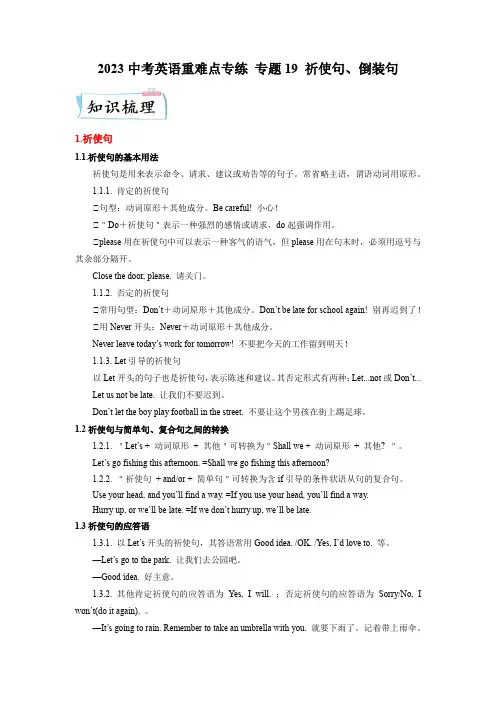
2023中考英语重难点专练专题19 祈使句、倒装句1.祈使句1.1.祈使句的基本用法祈使句是用来表示命令、请求、建议或劝告等的句子。
常省略主语,谓语动词用原形。
1.1.1. 肯定的祈使句①句型:动词原形+其他成分。
Be careful! 小心!①"Do+祈使句"表示一种强烈的感情或请求,do起强调作用。
①please用在祈使句中可以表示一种客气的语气,但please用在句末时,必须用逗号与其余部分隔开。
Close the door, please. 请关门。
1.1.2. 否定的祈使句①常用句型:Don’t+动词原形+其他成分。
Don’t be late for school again! 别再迟到了!①用Never开头:Never+动词原形+其他成分。
Never leave today’s work for tomorrow! 不要把今天的工作留到明天!1.1.3. Let引导的祈使句以Let开头的句子也是祈使句,表示陈述和建议。
其否定形式有两种:Let...not或Don’t...Let us not be late. 让我们不要迟到。
Don’t let the boy play football in the street. 不要让这个男孩在街上踢足球。
1.2祈使句与简单句、复合句之间的转换1.2.1. "Let’s + 动词原形+ 其他"可转换为"Shall we + 动词原形+ 其他? "。
Let’s go fishing this afternoon. =Shall we go fishing this afternoon?1.2.2. "祈使句+ and/or + 简单句"可转换为含if引导的条件状语从句的复合句。
Use your head, and you’ll find a way. =If you use your head, you’ll find a way.Hurry up, or we’ll be late. =If we don’t hurry up, we’ll be late.1.3祈使句的应答语1.3.1. 以Let’s开头的祈使句,其答语常用Good idea. /OK. /Yes, I’d love to. 等。
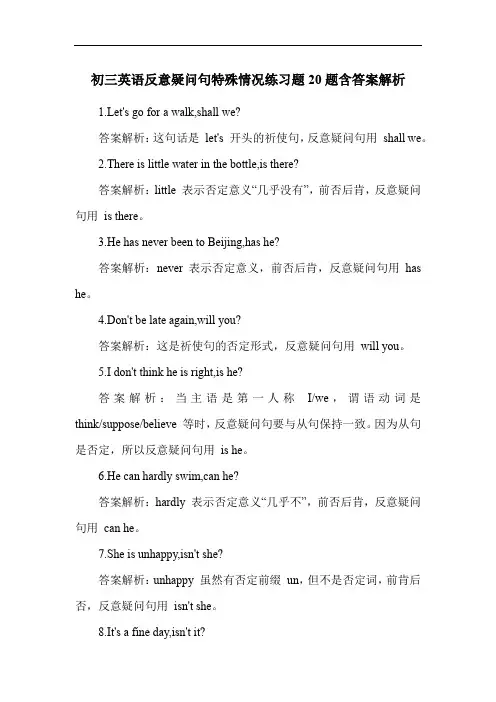
初三英语反意疑问句特殊情况练习题20题含答案解析1.Let's go for a walk,shall we?答案解析:这句话是let's 开头的祈使句,反意疑问句用shall we。
2.There is little water in the bottle,is there?答案解析:little 表示否定意义“几乎没有”,前否后肯,反意疑问句用is there。
3.He has never been to Beijing,has he?答案解析:never 表示否定意义,前否后肯,反意疑问句用has he。
4.Don't be late again,will you?答案解析:这是祈使句的否定形式,反意疑问句用will you。
5.I don't think he is right,is he?答案解析:当主语是第一人称I/we,谓语动词是think/suppose/believe 等时,反意疑问句要与从句保持一致。
因为从句是否定,所以反意疑问句用is he。
6.He can hardly swim,can he?答案解析:hardly 表示否定意义“几乎不”,前否后肯,反意疑问句用can he。
7.She is unhappy,isn't she?答案解析:unhappy 虽然有否定前缀un,但不是否定词,前肯后否,反意疑问句用isn't she。
8.It's a fine day,isn't it?答案解析:这是肯定的陈述句,前肯后否,反意疑问句用isn't it。
9.The boy is too young to go to school,is he?答案解析:too...to...表示否定意义“太……而不能……”,前否后肯,反意疑问句用is he。
10.You must be tired,aren't you?答案解析:must 表示推测“一定”时,反意疑问句根据must 后的动词形式来确定。
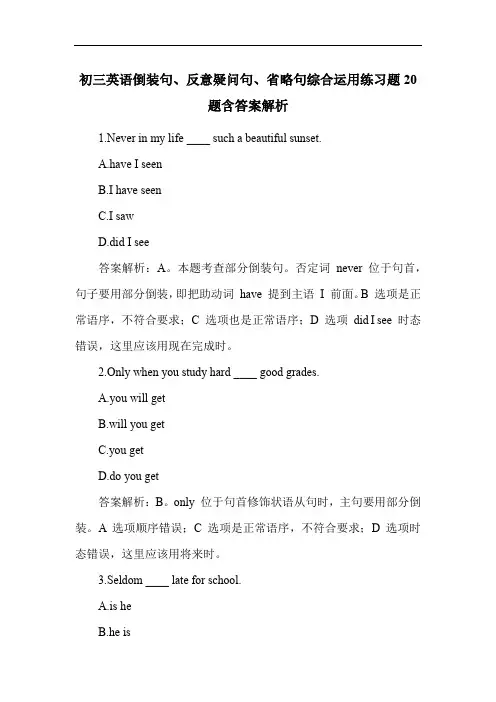
初三英语倒装句、反意疑问句、省略句综合运用练习题20题含答案解析1.Never in my life ____ such a beautiful sunset.A.have I seenB.I have seenC.I sawD.did I see答案解析:A。
本题考查部分倒装句。
否定词never 位于句首,句子要用部分倒装,即把助动词have 提到主语I 前面。
B 选项是正常语序,不符合要求;C 选项也是正常语序;D 选项did I see 时态错误,这里应该用现在完成时。
2.Only when you study hard ____ good grades.A.you will getB.will you getC.you getD.do you get答案解析:B。
only 位于句首修饰状语从句时,主句要用部分倒装。
A 选项顺序错误;C 选项是正常语序,不符合要求;D 选项时态错误,这里应该用将来时。
3.Seldom ____ late for school.A.is heB.he isD.he does答案解析:A。
seldom 位于句首,句子要用部分倒装,be late for 是固定短语,所以用is he。
B 选项是正常语序;C、D 选项中do 与be late for 不搭配。
4.Little ____ about his own safety, though he was in great danger himself.A.did he careB.he caredC.cares heD.he does care答案解析:A。
little 位于句首,句子要用部分倒装。
B 选项是正常语序;C、D 选项中cares 的用法错误,这里应该用过去时did care。
5.Hardly had he entered the room ____ the phone rang.A.whenB.thanC.thenD.as答案解析:A。
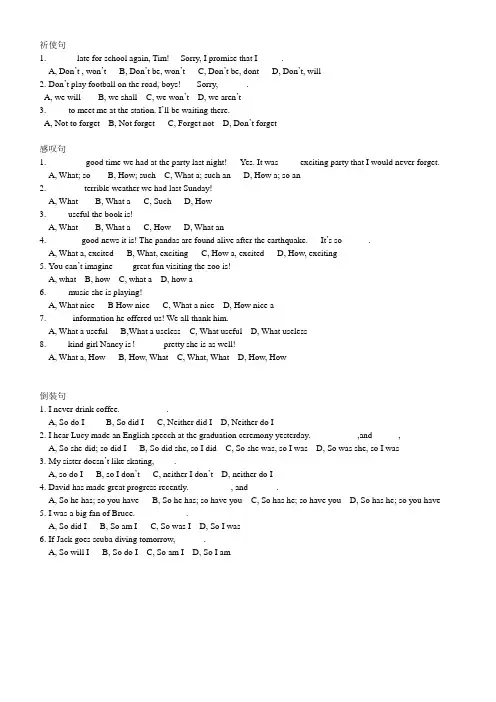
祈使句1.--- ____late for school again, Tim! ---Sorry, I promise that I _____.A, Don’t , won’t B, Don’t be, won’t C, Don’t be, dont D, Don’t, will2.Don’t play football on the road, boys! ---- Sorry, ______.A, we will B, we shall C, we won’t D, we aren’t3.____ to meet me at the station. I’ll be waiting there.A, Not to forget B, Not forget C, Forget not D, Don’t forget感叹句1.--- ______good time we had at the party last night! --- Yes. It was ____ exciting party that I would never forget. A, What; so B, How; such C, What a; such an D, How a; so an2.---- _____terrible weather we had last Sunday!A, What B, What a C, Such D, How3._____useful the book is!A, What B, What a C, How D, What an4.--- _____good news it is! The pandas are found alive after the earthquake. --- It’s so______.A, What a, excited B, What, exciting C, How a, excited D, How, exciting5.You can’t imagine ____great fun visiting the zoo is!A, what B, how C, what a D, how a6.____ music she is playing!A, What nice B How nice C, What a nice D, How nice a7._____ information he offered us! We all thank him.A, What a useful B,What a useless C, What useful D, What useless8. ____ kind girl Nancy is!____ pretty she is as well!A, What a, How B, How, What C, What, What D, How, How倒装句1.I never drink coffee. ---- _______.A, So do I B, So did I C, Neither did I D, Neither do I2.I hear Lucy made an English speech at the graduation ceremony yesterday. ---- _______,and______,A, So she did; so did I B, So did she, so I did C, So she was, so I was D, So was she, so I was3.My sister doesn’t like skating, ____.A, so do I B, so I don’t C, neither I don’t D, neither do I4.David has made great progress recently. ---- ______, and ______.A, So he has; so you have B, So he has; so have you C, So has he; so have you D, So has he; so you have 5.I was a big fan of Bruce. ---- ________.A, So did I B, So am I C, So was I D, So I was6.If Jack goes scuba diving tomorrow, ______.A, So will I B, So do I C, So am I D, So I am反义疑问句1.There’s something wrong with your bike, _____? --- Yes. I’ll have it ____ tomorrow.A, isn’t it, mend B, isn’t there, mended C, isn’t it, mended D, isn’t there, mend2.I hear the tall girl wearing glasses is from America, _____?A, has she B, isn’t she C, hasn’t she D, does she3.Alice had nothing for breakfast this morning, _____? -----No. She got up too late.A, had she B, hadn’t she C, did she D, didn’t she4.Let’s go to the zoo by taxi, ____? ----Maybe we can go there _____. It’s not far.A, won’t you, no foot B, won’t you, by foot C, shall we, by foot D, shall we, on foot5.Why is Tom absent? ---- He must be sick, _____?A, isn’t he B, must he C, is he D, musn’t he6.E-mail is very popular today. People seldom write letters now, ____?A, did they B, do they C, didn’t they7.I don’t think Ken did such a stupid thing, ____?A, do I B, did I C, did he D, does he8.At the meeting Mr. King didn’t say a word at all, ____?A, didn’t Mr. King B, did he C, did Mr. King D, didn’t he9.Mr. Wang’s never been to Canada, _____ he? ---- _______. He went there on business last week.A, has he; Yes, he has B, is he; No, he isn’t C, hasn’t he, No, he hasn’t D, isn’t he, Yes, he is.10.Lily usually helps others, _____?A, does she B, doesn’t she C, isn’t she C, won’ t shelions of people know about Susan Boyle now, ____?---- _______, she becomes well-known because of her success on Britain’s Got Talent.A, do they, No B,do they, Yes C, don’t they, No D, don’t they, Yes12.There used to be some trees by the lake, ____?A, used there B, were there C, usedn’t there D, wasn’t there13.Few well-known singers came to the concert, ______? --- _____, such as Andy Lau, Jay Chou and Kristy Zhang. A, didn’t they,;No, they didn’t B, didn’t they ;Yes, they didC, did they,;No, they didn’t D, did they; Yes, they did14.She’s done her best, _____?A, isn’t she B, is she C, hasn’t she C, has she15.There’s little tea in the cup, ____?A, isn’t it B, is it C, is there D, isn’t there16. Many people used to listen to the radio, ______?A, used they B, weren’t they C, didn’t they D, did they17.I don’t think the girl is right, ____?A, do I B, is she C, isn’t she D, does she18.You lent me some money a few months ago. ---- ______? I don’t remember at all.A, Did I B, Did you C, Didn’t I D, Didn’t you19.You have few friends, _____?A, haven’t you B, have you C, don’t you D, are you20.Nothing has been decided yet, ______?A, was it B, has it C, did they D, have they21.Alice has to finish her work now, ____?A, has he B, hasn’t she C, does she D, doesn’t she22.He can hardly speak English, ________?A, can he B, can’t he C, isn’t he D, does he23, She is too young to go to school, _____ she? A, is B, isn’t C, does D, doesn’t。
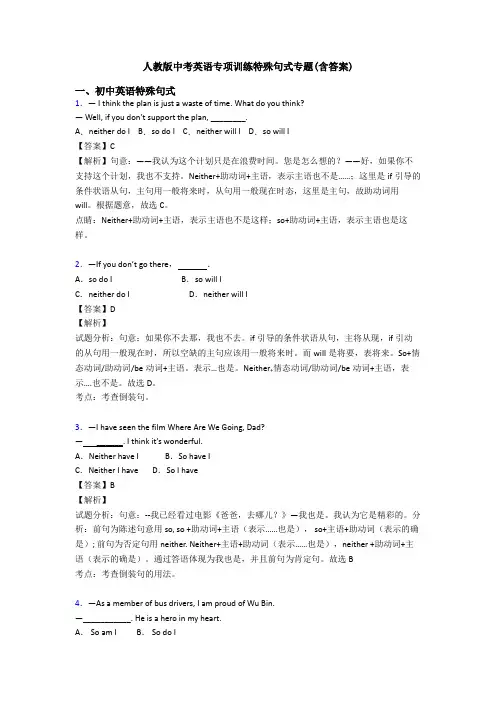
人教版中考英语专项训练特殊句式专题(含答案)一、初中英语特殊句式1.— I think the plan is just a waste of time. What do you think?—Well, if you don’t support the plan, ________.A.neither do I B.so do I C.neither will I D.so will I【答案】C【解析】句意:——我认为这个计划只是在浪费时间。
您是怎么想的?——好,如果你不支持这个计划,我也不支持。
Neither+助动词+主语,表示主语也不是……;这里是if引导的条件状语从句,主句用一般将来时,从句用一般现在时态,这里是主句,故助动词用will。
根据题意,故选C。
点睛:Neither+助动词+主语,表示主语也不是这样;so+助动词+主语,表示主语也是这样。
2.—If you don’t go there,.A.so do I B.so will IC.neither do I D.neither will I【答案】D【解析】试题分析:句意:如果你不去那,我也不去。
if引导的条件状语从句,主将从现,if引动的从句用一般现在时,所以空缺的主句应该用一般将来时。
而will是将要,表将来。
So+情态动词/助动词/be动词+主语。
表示…也是。
Neither+情态动词/助动词/be动词+主语,表示….也不是。
故选D。
考点:考查倒装句。
3.—I have seen the film Where Are We Going, Dad?— ______. I think it’s wonderful.A.Neither have I B.So have IC.Neither I have D.So I have【答案】B【解析】试题分析:句意:--我已经看过电影《爸爸,去哪儿?》—我也是。
我认为它是精彩的。
分析:前句为陈述句意用so, so +助动词+主语(表示……也是), so+主语+助动词(表示的确是); 前句为否定句用neither. Neither+主语+助动词(表示……也是),neither +助动词+主语(表示的确是)。
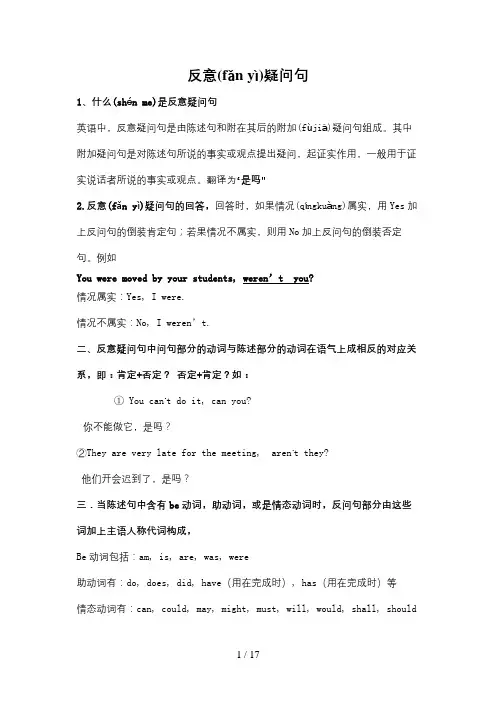
反意(fǎn yì)疑问句1、什么(shén me)是反意疑问句英语中,反意疑问句是由陈述句和附在其后的附加(fùjiā)疑问句组成。
其中附加疑问句是对陈述句所说的事实或观点提出疑问,起证实作用,一般用于证实说话者所说的事实或观点。
翻译为“是吗”2.反意(fǎn yì)疑问句的回答,回答时,如果情况(qíngkuàng)属实,用Yes加上反问句的倒装肯定句;若果情况不属实,则用No加上反问句的倒装否定句。
例如You were moved by your students, weren’t you?情况属实:Yes, I were.情况不属实:No, I weren’t.二、反意疑问句中问句部分的动词与陈述部分的动词在语气上成相反的对应关系,即:肯定+否定?否定+肯定?如:①You can’t do it, can you?你不能做它,是吗?②They are very late for the meeting, aren’t they?他们开会迟到了,是吗?三.当陈述句中含有be动词,助动词,或是情态动词时,反问句部分由这些词加上主语人称代词构成,Be动词包括:am, is, are, was, were助动词有:do, does, did, have(用在完成时), has(用在完成时)等情态动词有:can, could, may, might, must, will, would, shall, should例如:She is a lovely girl, isn’t she?她是一个可爱的女孩,是吗?He will go home, __won’t__ __he__?他要回家了,是吗?She doesn’t l ike to eat popcorn, __does__ _she___?她不喜欢吃爆米花,是吗?The baby won’t sleep early, will it?小宝宝睡得不早,是吗?注意:①He has supper at home every day,doesn’t he? (不能用hasn’t he?)他每天在家吃晚饭,是吗?②They have known the matter, haven’t they? (不能用don’tthey?)他们已经知道那事情了,是吗?四.当陈述句中只含有行为动词时,若动词加了s,就用does, 若动词为原形,就用do,动词为过去式,则用did,例如:You cleaned your house last week, _didn’t___ __you__?你上周打扫了你的房间,是吗?Your father plays the computer very well, __doesn’t__ ___he _?你父亲电脑技术很好,是吗?They look so happy today, _don’t ___ _they___?你今天(jīntiān)看起来很高兴,是吗?五.反意(fǎn yì)疑问句的陈述部分带有little, few, never, hardly, seldom,nobody, nothing, barely, scarcely等否定(fǒudìng)意义的词时,问句部分用肯定式。
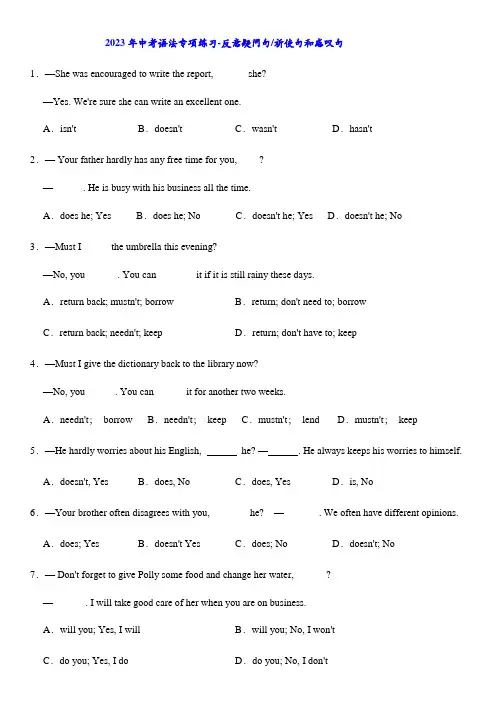
2023年中考语法专项练习-反意疑问句/祈使句和感叹句1.—She was encouraged to write the report, ______ she?—Yes. We're sure she can write an excellent one.A.isn't B.doesn't C.wasn't D.hasn't2.— Your father hardly has any free time for you, ____?—______. He is busy with his business all the time.A.does he; Yes B.does he; No C.doesn't he; Yes D.doesn't he; No3.—Must I _____ the umbrella this evening?—No, you ______. You can _______ it if it is still rainy these days.A.return back; mustn't; borrow B.return; don't need to; borrowC.return back; needn't; keep D.return; don't have to; keep4.—Must I give the dictionary back to the library now?—No, you______. You can______ it for another two weeks.A.needn't;borrow B.needn't;keep C.mustn't;lend D.mustn't;keep5.—He hardly worries about his English, he? —. He always keeps his worries to himself.A.doesn't, Yes B.does, No C.does, Yes D.is, No6.—Your brother often disagrees with you, _______ he? —_______. We often have different opinions.A.does; Yes B.doesn't Yes C.does; No D.doesn't; No7.— Don't forget to give Polly some food and change her water, ______?— ______. I will take good care of her when you are on business.A.will you; Yes, I will B.will you; No, I won'tC.do you; Yes, I do D.do you; No, I don't8.—One of the hosts of The Point named Liu Xin graduated from our school, didn't she?—__________ My English teacher taught her before.A.Yes, she was. B.No, she wasn't. C.Yes, she did. D.No, she didn't. 9.—colors can't affect our moods, can they?—_______. They can ______ us feel happy or sad, energetic or sleepy.A.Yes, change B.No, make C.Yes, make D.No, help10.She needs little money for tickets, ________?A.doesn't she B.needn't she C.need she D.does she 11.—Could you please tell me ? —With pleasure. Wait a moment, please.A.if the scarf looked nice on me B.what's the new product likeC.that Guilin is worth visiting D.how I can order a robot online12.—Millie never did the housework after she bought the robot, _______?—______. She could relax and have time for her hobbies.A.did she; Yes B.didn't she; No C.didn't she; Yes D.did she; No13.— She's seldom asked to do the housework at home, ________ she?— ________ Her parents are very busy with their work, so she has to do some cleaning every day.A.has; Yes B.hasn't; No C.is; Yes D.isn't; No14.There is little doubt in your mind that he is guilty, ?A.is there B.isn't there C.is he D.isn't he15.—is it from the park to the supermarket? —It is about fifteen walk.A.How long, minutes B.How far, minutes C.How long, minutes' D.How far, minutes'16.— I can't understand some people choose to challenge themselves.— Don't you think it's also a good chance to find your hidden talent?A.when B.how C.why D.where 17.—The secretary is already on the way to the company, she?—She was badly hurt in the accident and sent to the hospital.A.hasn't; Yes B.hasn't; No C.isn't; Yes D.isn't; No 18.— I'm not good at playing cards, you know.— ______! It's just for fun.A.What a surprise B.What a shame C.Don't say so D.Come on 19.______ to smile at your life when you are in trouble, and you will soon be happy again.A.Try B.To try C.Trying D.Tried 20.Daniel, ______ play with the mobile phone while you're walking in the street.A.don't B.doesn't C.won't D.can't 21.Do you want to be healthy? Just _______. Smiling can help you stay healthy.A.smile B.smiling C.to smile D.smiled 22.—Sorry, I'm late, Mrs. White. —__________ here on time next time.A.Be B.Being C.To be D.Don't be 23.______ the way you talk. It's impolite to talk ______ .A.Minding; except your mouth full B.Minding; with your mouth fullC.Mind; except your mouth full D.Mind; with your mouth full 24.—You can't imagine ____ great difficulty we have____ the problem.—Really? But it may cause you a lot of trouble.A.how; to solve B.how a; solving C.what; solving D.what a; to solve 25.—New traffic rules are the strictest in history.—___ useful information you gave me! The roads will be much safer then.A.How B.What an C.What a D.What 26.The volunteers really provided the athletes with support.—Exactly. _______ they helped make the event.A.What a great success B.What great successC.How a great success D.How great success27._____fun we have______ with each other at lunchtime!A.How; to chat B.What; chatting C.What; to chat D.How; chatting 28.— _____ nice music lesson Mrs. Wu gave us today! —Yes. We enjoyed it very much.A.What B.What a C.How D.How a 29.—It is raining again. We haven't seen the sun for days—bad weather it is!A.What a B.What C.How a D.How 30.—Have you seen the hot film Wandering Earth________?—Yes, I have.________ wonderful science fiction movie it is!A.yet, How a B.already, How C.yet, What a D.already, What 31.—Wow, useful and fashionable iPhone 7S you have bought!— Yes, it is of great help to me. I must say it also cost me a lot.A.What a; But B.What an; And C.What a; And D.How; But 32.________bad news it is and _______ the children all look!A.What a; how surprised B.What; how surprisingC.What; how surprised D.How; what surprised33.Look! fantastic time they are having!A.What B.What a C.How D.How a34.—the music sounds! —Yes. It reminds us our happy childhood.A.What wonderful, about B.How wonderful, ofC.What wonderfully, about D.How wonderfully, of.35.— It is said that 5G is coming. It will improve our life greatly! — ________ amazing news it is!A.What an B.How a C.What D.How36.— It's said that scientists have carried out the vaccine of the COVID-19!— _________ amazing news it is!A.What an B.How an C.What D.How37.—___________great fun we had in the park yesterday! —Yes, I will never forget it.A.What a B.What C.How a D.How38._______ complete mess your room is! You need to tidy it up.A.How B.What a C.What D.How a 39.—Robinson Crusoe lived on a lonely island for a lot of years and there he learnt to keep wild goats for milk and grow crops for food. —___________ unusual experience!A.How B.What C.What an D.What a40.______ great information report he has given!A.What a B.What C.How D.What an41.______ the famous teacher won from both her students and the students' parents!A.What a high praise B.What high praiseC.How high praise D.How a high praise42._________ bad news it is and __________ the children all look!A.What a; how surprised B.What; how surprisedC.What; how surprising D.How; what surprised43.________ he has provided for us!A.What a useful advice B.What useful suggestionsC.How useful the advice D.How useful suggestions44.The air pollution in the small town is getting worse. People have to wear thick masks almost every day. __________ !A.What a shame B.What shame C.What a surprise D.What surprise45.— Children are the future and hope of our motherland.—important work it is to teach children!A.How B.How an C.What D.What an46.______ little sheep they are! But they are ______lovely!A.What; so B.What; such C.How; so D.How; such47.________ space! Let's wait for another bus.A.How crowded B.How a crowded C.What a crowded D.What crowded 48.—How was your voluntary work in Africa? —Oh, amazing experience! I'll never forget it!A.what B.what an C.how D.how an49.—_______ exciting the speech about “Belt and Road” was!— Of course! It was a really great inspiration(鼓舞) to the world.A.How B.What C.How an D.What an 50._______ terrible environment! The pollution here is even more serious than I __ .A.What a; thought B.How; think C.What an; think D.How; thought Keys1-5CBDBC 6-10BBCCD 11-15DDCAD 16-20CDDAA 21-25AADCD26-30ABBBC 31-35ACBBC 36-40CBBCA 41-45BBBAC 46-50ADBAA。
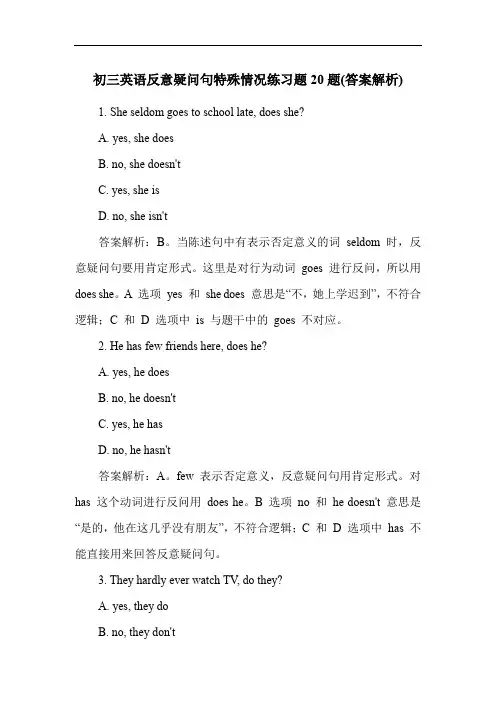
初三英语反意疑问句特殊情况练习题20题(答案解析)1. She seldom goes to school late, does she?A. yes, she doesB. no, she doesn'tC. yes, she isD. no, she isn't答案解析:B。
当陈述句中有表示否定意义的词seldom 时,反意疑问句要用肯定形式。
这里是对行为动词goes 进行反问,所以用does she。
A 选项yes 和she does 意思是“不,她上学迟到”,不符合逻辑;C 和D 选项中is 与题干中的goes 不对应。
2. He has few friends here, does he?A. yes, he doesB. no, he doesn'tC. yes, he hasD. no, he hasn't答案解析:A。
few 表示否定意义,反意疑问句用肯定形式。
对has 这个动词进行反问用does he。
B 选项no 和he doesn't 意思是“是的,他在这几乎没有朋友”,不符合逻辑;C 和D 选项中has 不能直接用来回答反意疑问句。
3. They hardly ever watch TV, do they?A. yes, they doB. no, they don'tC. yes, they areD. no, they aren't答案解析:A。
hardly ever 表示否定意义,反意疑问句用肯定形式。
对watch 这个动词进行反问用do they。
B 选项no 和they don't 意思是“是的,他们几乎不看电视”,不符合逻辑;C 和D 选项中are 与题干中的watch 不对应。
4. There is little water in the bottle, is there?A. yes, there isB. no, there isn'tC. yes, there hasD. no, there hasn't答案解析:A。
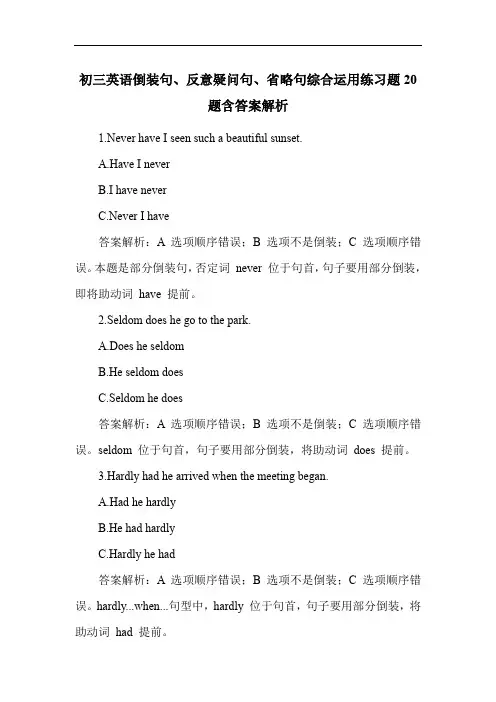
初三英语倒装句、反意疑问句、省略句综合运用练习题20题含答案解析1.Never have I seen such a beautiful sunset.A.Have I neverB.I have neverC.Never I have答案解析:A 选项顺序错误;B 选项不是倒装;C 选项顺序错误。
本题是部分倒装句,否定词never 位于句首,句子要用部分倒装,即将助动词have 提前。
2.Seldom does he go to the park.A.Does he seldomB.He seldom doesC.Seldom he does答案解析:A 选项顺序错误;B 选项不是倒装;C 选项顺序错误。
seldom 位于句首,句子要用部分倒装,将助动词does 提前。
3.Hardly had he arrived when the meeting began.A.Had he hardlyB.He had hardlyC.Hardly he had答案解析:A 选项顺序错误;B 选项不是倒装;C 选项顺序错误。
hardly...when...句型中,hardly 位于句首,句子要用部分倒装,将助动词had 提前。
4.Little did he know about the surprise.A.Did he littleB.He little didC.Little he did答案解析:A 选项顺序错误;B 选项不是倒装;C 选项顺序错误。
little 位于句首,句子要用部分倒装,将助动词did 提前。
5.Not until he finished his homework did he go to bed.A.Did he not untilB.Not until he didC.He did not until答案解析:A 选项顺序错误;B 选项不是完整的句子;C 选项不是倒装。
not until 位于句首,句子要用部分倒装,将助动词did 提前。
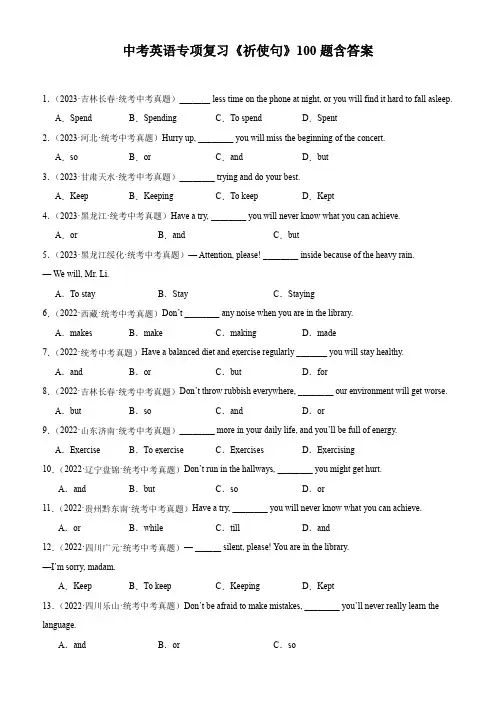
中考英语专项复习《祈使句》100题含答案1.(2023·吉林长春·统考中考真题)_______ less time on the phone at night, or you will find it hard to fall asleep.A.Spend B.Spending C.To spend D.Spent2.(2023·河北·统考中考真题)Hurry up, ________ you will miss the beginning of the concert.A.so B.or C.and D.but3.(2023·甘肃天水·统考中考真题)________ trying and do your best.A.Keep B.Keeping C.To keep D.Kept4.(2023·黑龙江·统考中考真题)Have a try, ________ you will never know what you can achieve.A.or B.and C.but5.(2023·黑龙江绥化·统考中考真题)— Attention, please! ________ inside because of the heavy rain.— We will, Mr. Li.A.To stay B.Stay C.Staying6.(2022·西藏·统考中考真题)Don’t ________ any noise when you are in the library.A.makes B.make C.making D.made7.(2022·统考中考真题)Have a balanced diet and exercise regularly _______ you will stay healthy.A.and B.or C.but D.for8.(2022·吉林长春·统考中考真题)Don’t throw rubbish everywhere, ________ our environment will get worse.A.but B.so C.and D.or9.(2022·山东济南·统考中考真题)________ more in your daily life, and you’ll be full of energy.A.Exercise B.To exercise C.Exercises D.Exercising10.(2022·辽宁盘锦·统考中考真题)Don’t run in the hallways, ________ you might get hurt.A.and B.but C.so D.or11.(2022·贵州黔东南·统考中考真题)Have a try, ________ you will never know what you can achieve.A.or B.while C.till D.and12.(2022·四川广元·统考中考真题)— ______ silent, please! You are in the library.—I’m sorry, madam.A.Keep B.To keep C.Keeping D.Kept13.(2022·四川乐山·统考中考真题)Don’t be afraid to make mistakes, ________ you’ll never really learn the language.A.and B.or C.so14.(2022·江西·统考中考真题)Don’t leave your toys on the table, or I ________ them away.A.threw B.will throw C.have thrown D.was throwing15.(2022·四川遂宁·统考中考真题)—Sam, ________ run in the hallways. It’s very dangerous.—Sorry, Ms. Black.A.do B.don’t C.not D.doesn’t16.(2021·山东济南·统考中考真题)—________ swim in this river. It’s quite deep.—Thanks for telling me.A.No B.Not C.Don’t D.Doesn’t17.(2021·贵州毕节·统考中考真题)—Mike, ________ play football in the street next time. It’s dangerous.—OK, I won’t do that again, mom.A.mustn’t B.must C.don’t D.do18.(2021·吉林长春·统考中考真题)Write down these useful sentences, ________ you’ll forget them.A.and B.or C.but D.so19.(2021·内蒙古呼和浩特·统考中考真题)________ to use sunglasses to stop the sun from shining directly in your eyes.A.Remembering B.To remember C.Remember D.Not remember20.(2021·辽宁大连·统考中考真题)________ at people when you talk. This is a polite way of communication in China.A.Look B.Looking C.To look D.Looked21.(2021·辽宁丹东·统考中考真题)If you want to get good grades, ________ in as much effort as possible.A.putting B.put C.to put D.puts22.(2023·吉林长春·吉林省实验校考三模)________ action now, or you’ll never achieve your dream.A.To take B.Taking C.Take D.Took23.(2023·吉林松原·统考一模)_________ more, and you will make great progress in Chinese writing.A.To practice B.Practicing C.Practice24.(2023·黑龙江哈尔滨·哈尔滨市第十七中学校校考一模)If something is important enough for you, it’s worth doing well, so ________ to study for the coming challenge.A.go out of your way B.trying your best C.to make an effort25.(2023·黑龙江哈尔滨·统考二模)You shouldn’t put so many things on the shelf, ________ it will be broken.A.and B.so C.or26.(2023·黑龙江绥化·校考一模)________ at the door before entering, please.27.(2023·辽宁铁岭·校联考一模)Don’t be afraid to make mistakes, ________ you’ll never really learn the language well.A.and B.or C.though D.but28.(2023·湖北襄阳·襄阳四中校考二模)—Mark, hurry up, ________ we’ll be late for the film.—All right, Mum. I’m coming.A.or B.but C.because D.though29.(2023·四川成都·统考二模)The next time you see a cute little monkey, don’t make a noise, just ________ quiet.A.keeping B.to keep C.keep30.(2023·青海海东·统考三模)—Luke, ________ cross the road until the traffic lights turn green.—OK. Don’t worry, Dad. I never break traffic rules.A.not B.can’t C.don’t31.(2023·北京房山·统考二模)Have breakfast every morning ________ you’ll get ill.A.and B.or C.but D.because32.(2023·辽宁丹东·统考一模)Practice more, ________ you’ll make progress.A.and B.but C.so D.or33.(2023·四川乐山·统考模拟预测)Study hard, ________ you will not have a good result in the exam.A.and B.or C.but34.(2023·天津河西·统考二模)Study hard, ________ you’ll have a bright future.A.or B.because C.but D.and35.(2023·四川成都·统考二模)Give me a chance, ________ I will give you a wonderful surprise.A.and B.or C.but36.(2023·甘肃陇南·统考二模)_________ forget to fold your clothes.A.Don’t B.Doesn’t C.Didn’t D.Do37.(2023·云南玉溪·统考三模)Don’t forget to see the black-headed gulls(红嘴鸥) if you come to Kunming in winter, ________ you’ll regret.A.or B.and C.but D.so38.(2023·江西上饶·统考一模)Make more effort, _______ you will win the competition.A.and B.so C.but D.or39.(2023·北京海淀·二模)Read these books, ________ you’ll get to know more about Chinese tea culture.A.though B.unless C.and D.but40.(2023·上海杨浦·统考三模)Hurry up, ________ you’ll be late for the movie with Susan.41.(2023·江苏南通·统考二模)Tommy, ________ play basketball in the street next time. You may get hit by a car.A.do B.don’t C.doesn’t D.mustn’t42.(2023·上海杨浦·统考二模)Don’t stay up late, ________ you will feel sleepy the next day.A.so B.and C.but D.or43.(2023·江苏淮安·统考二模)—Be quick, ________ we will miss the beginning of the film.—Don’t worry. The film will start half an hour later.A.and B.but C.so D.or44.(2023·江苏南通·模拟预测)When faced with a hot potato, simply ________ calm and you will find out the way to solve it.A.staying B.stay C.to stay D.stayed45.(2023·江苏徐州·统考二模)_____ in what you want, and AI tools can create pictures in minutes.A.Typing B.To type C.Type D.Typed46.(2023·江苏徐州·统考二模)—Learning to love is like learning to walk.—Yes. Step out bravely ________ you’ll find it’s not so difficult.A.or B.and C.but D.so47.(2023·云南昭通·统考二模)Work hard and try to get better, and then you ________ successful more easily.A.become B.became C.will become D.was becoming48.(2023·上海宝山·统考二模)“Peter, ________ your lesson again. The final exam is coming soon.” said Mum.A.went over B.going over C.to go over D.go over49.(2023·上海嘉定·统考二模)Save and protect natural resources, ________ we’ll run out of them in the near future.A.but B.so C.and D.or50.(2023·湖南郴州·统考一模)—________ silent, please! You are in the library.—I’m sorry, madam.A.Keep B.To keep C.Keeping51.(2023·辽宁阜新·统考二模)Understand others, ________ you will find it easy to get on with others.A.and B.but C.so D.or52.(2023·黑龙江齐齐哈尔·校联考一模)—What’s the secret to English learning?—Practice more, ________ you will learn English better.A.or B.though C.and53.(2023·河北石家庄·统考二模)Keep going, ________ you’ll make it one day.54.(2023·北京·模拟预测)—It seems that it is going to rain.—That’s true. Take an umbrella with you, ________ you may get wet.A.and B.but C.or D.so55.(2023·广西南宁·南宁十四中校考一模)Wash your hands before meals, ________ you may get ill.A.and B.then C.or56.(2023·海南省直辖县级单位·统考一模)—My aim is to go to Tsinghua University for further study.—Work hard, ________ you can make it.A.if B.so C.and57.(2023·广西柳州·统考一模)—________ on this book, Lucy!—Sorry, I won’t.A.Drawing B.Draw C.Don’t draw58.(2023·上海·一模)Jane, get up early, ________ you will miss the early bus.A.or B.so C.but D.and59.(2023·上海·一模)Jack, ________ to the front door to see if someone is knocking.A.goes B.going C.go D.to go60.(2023·全国·模拟预测)________ smoke here, Dad. Smoking is not allowed in public places.A.Don’t B.Don’t be C.Not to be D.Be not61.(2023·上海·模拟预测)Leave the reference books behind, ________ you won’t be able to think yourself.A.and B.or C.but D.then62.(2023·上海·一模)Don’t stay up late, ________ you will feel sleepy the next day.A.so B.or C.but D.and63.(2023·黑龙江哈尔滨·统考一模)Follow the P. E. teacher’s instructions, ________ you may get hurt when exercising.A.so B.or C.but64.(2023·北京顺义·统考二模)Hurry up, ________ we’ll be late for school!A.and B.but C.or D.so65.(2023·重庆巴南·统考一模)Hurry up, ________ you’ll miss the early bus.A.or B.and C.so D.but66.(2023·山东青岛·统考一模)Mind your steps as you go, ________ you’ll fall down into the river.A.and B.but C.so D.or67.(2023·河北沧州·校考三模)Keep working hard, ________ you will find lots of hidden abilities in yourself.68.(2023·江苏扬州·统考二模)—Mum, what time is it now?—It’s 6:20. Get up, ________ you’ll be late for school.A.so B.and C.or D.but69.(2023·重庆合川·统考一模)You’d better take care, _____ you will hurt your eyesA.so B.but C.or D.and70.(2023·山东青岛·统考二模)Smile to the world, ________ the world will smile back to you.A.nor B.but C.or D.and71.(2023·九年级单元测试)Work hard, _______ you may catch up with your classmates soon.A.or B.but C.and D.yet72.(2023春·黑龙江哈尔滨·九年级哈尔滨市虹桥初级中学校校考阶段练习)_______ a habit of reflecting(反思) on how you learn, and you will do well in everything you learn.A.Develop B.To develop C.Developing73.(2023春·北京西城·九年级北京市第三十五中学校考阶段练习)You’d better take a taxi, ________ you will be late for school.A.and B.but C.or D.so74.(2023·上海·九年级专题练习)________ more, and you will make your spoken English better and better.A.Speak B.Say C.To speak D.To say75.(2022·重庆巴南·校联考模拟预测)—Peter, go to bed early, ________ you can’t catch the early bus tomorrow morning.—Ok, I will.A.and B.so C.but D.or76.(2022·黑龙江大庆·大庆外国语学校校考模拟预测)Let’s sit down and have a good look at your design,________?A.can’t you B.will you C.don’t we D.shall we77.(2022·吉林·模拟预测)Lily, put on your coat, ________ you will catch a cold.A.or B.so C.and78.(2022·广西贵港·统考三模)—Peter, ________ the rubbish into different litter bins according to the signs. —All right, mom.A.puts B.put C.to put D.putting79.(2022·吉林长春·吉林省第二实验学校校考模拟预测)—________ the endangered animals from now on, or they will die out one day.A.Protecting B.To protect C.Protect D.Protects80.(2022·吉林长春·校考模拟预测)________ off the shower while you are washing your hair. It saves energy.A.Turning B.To turn C.Turn D.Turned81.(2022·吉林长春·校考二模)_______ to express yourself honestly, and you will find it easy to make some friends.A.Learn B.To learn C.Learned D.Learning82.(2022·吉林长春·校考模拟预测)—________ some wild animals from now on, or they will die out one day.—Yes, you are right.A.Protecting B.To protect C.Protect D.Protects83.(2022·吉林长春·长春市解放大路学校校考模拟预测)________ me a chance and I’ll bring you a surprise.A.Giving B.Gives C.To give D.Give84.(2022·吉林长春·长春市解放大路学校校考一模)Smile to the world, ________ the world will smile back to you.A.if B.but C.or D.and85.(2022·海南省直辖县级单位·统考二模)— Mike, ________ wake up your mother. She just fell asleep.— OK, dad.A.don’t B.doesn’t C.not to86.(2022·吉林长春·长春市解放大路学校校考模拟预测)________ more, and you will make great progress in English.A.To practice B.Practicing C.Practice D.Practiced87.(2022·吉林长春·校考二模)________ helpful, and you’ll get a helping hand when in trouble.A.To be B.Being C.Is D.Be88.(2022·青海玉树·校考模拟预测)William, ________ over what I have said, and I think you will make a right decision.A.thinking B.think C.to think89.(2022·吉林四平·统考二模)It’s rather windy today. Put on some warm clothes, ________ you’ll catch a cold.A.and B.but C.or90.(2022·吉林四平·统考二模)Jack, ________ play around here. Your sister is asleep now.A.doesn’t B.don’t C.no91.(2022·江苏南通·模拟预测)—I’m worried about the senior school entrance exam.—Work hard and be confident, ________ your dream will come true.92.(2022·辽宁丹东·模拟预测)________ sure that you put in as much effort as possible, or you will lose the chance.A.Make B.Making C.To make D.Made93.(2022·湖北孝感·统考三模)—________, David. You fall asleep in class again!—I’m sorry, Mr. Smith. I promise that I ________.A.Wake up; won’t B.Waking up; won’t C.Wakes up; can’t D.Wake up; can’t94.(2022·内蒙古包头·统考一模)—Luke, ________ cross the road until the traffic lights turn green.—OK. Don’t worry, Mom. I never break traffic rules.A.not B.can’t C.won’t D.don’t95.(2022·吉林长春·统考模拟预测)________ it over, and you will be able to work out the problem.A.Thinking B.To think C.Think D.Thinks96.(2022·黑龙江绥化·统考三模)________ trying and encouraging yourself if you want to succeed in something.A.To keep B.Keeping C.Keep97.(2022·吉林长春·统考一模)Mary, keep away from the fire, ________ you will hurt yourself.A.and B.so C.but D.or98.(2022·黑龙江哈尔滨·统考三模)—I’m sorry to tell a lie again.—________ an honest boy next time, or you’ll be punished.A.Be B.Being C.To be99.(2022·青海西宁·统考一模)Hurry up, ________ you will miss the bus.A.so B.or C.but D.and100.(2022·黑龙江·统考二模)—I’m afraid that I may not win the match.—Believe in yourself, ________ you’ll miss such a nice chance.A.and B.but C.or参考答案:1.A【详解】句意:晚上少花点时间在电话上,否则你会发现很难入睡。
专题05 感叹句、祈使句、倒装句等特殊句式感叹句是历年中考常考的题型,通常以单项选择的形式呈现。
题干不复杂,但更多会注入情景元素来加大考试的难度。
中考考查重点:1.感叹句的基本用法;2.对引导词what 和how 的选择。
祈使句就是表示请求、命令、建议、祝愿、邀请或要求的句子。
其中句首的动词要用原型。
中考考查祈使句类型:1.肯定的祈使句:(1)动词原形+其他/ Do+动词原形+其他,加强语气。
Stand up, please. = Please stand up. /Do e on time!(2)Be + adj.如:Be careful! = Look out! = Take care!(3)Let's + 动词原形如:Let’s go to school together.2.否定的祈使句①Don't + 动词原形Don't stand up./Don't be careless.①Let's + not + 动词原形. Let's not say anything about it.此外,中考英语会少量涉及到特殊疑问句、反义疑问句及倒装句考点。
1.(2011·山东济南·中考真题)— ________ a year does your school have sports meetings?— Twice a year.A.How often B.How soonC.How long D.How many times【答案】D【详解】句意:——你们学校一年开几次运动会?——一年两次。
考查特殊疑问句。
A. How often多久一次,问频率;B. How soon多久以后;C. How long多长,对时间或物体长度提问;D. How many times多少次,问次数。
空格处后a year对时间做了限制,即一年内,不能再用How often进行提问,只能用How many times提问,故选D。
中考英语特殊句式一、祈使句结构:A.肯定【do+宾语;be+形容词;let sb+do;】B. 否定【don’t do+宾语;don’t be+形容词;don’t let sb do =let sb not+do】注意:let’s sb do转为否定句:let’s not do【课堂练习】1._______ wake up your sister, Ben. She needs a good sleep.A. Don’tB. Doesn’tC. Aren’tD. Can’t2.—Sorry I’m late.—_______ tell me the bus broke down again!A. Never toB. NotC. Don’tD. No3.________ when you cross the road.A Do careB CareC Do be carefulD To be careful4. ________him the secret, will you?A Don’t tellB Not to tellC Not tellingD No telling5. ________ in bed. It’s bad for your eyes.A Not to readB Don’t readC Don’t to readD Not read6 .Her doctor said: “________ work so hard”A StopB Don’tC Can’tD No7. Sindy, ________ to be here at 8 o’clockA is sureB is sure thatC will be sureD be sure二、倒装句其句型可归纳为:so / neither + be / have / 助动词/ 情态动词+ 主语。
如:1.—I won't do such a thing. 我可不做这样的事。
初三英语反意疑问句特殊情况练习题40题1. She seldom goes to the park, does she?A. Yes, she does.B. No, she doesn't.答案解析:A 选项“是的,她去”。
前半句说她很少去公园,seldom 表示否定,反意疑问句遵循前否后肯原则,所以后半句用肯定形式。
如果她确实去了公园,就用“Yes, she does.”;如果她没去公园,就用“No, she doesn't.”。
2. He hardly ever plays basketball, does he?A. Yes, he does.B. No, he doesn't.答案解析:A 选项“是的,他打”。
前半句说他几乎不打篮球,hardly ever 表示否定,反意疑问句遵循前否后肯原则,所以后半句用肯定形式。
如果他打了篮球,就用“Yes, he does.”;如果他没打篮球,就用“No, he doesn't.”。
3. They never eat junk food, do they?A. Yes, they do.B. No, they don't.答案解析:A 选项“是的,他们吃”。
前半句说他们从不吃垃圾食品,never 表示否定,反意疑问句遵循前否后肯原则,所以后半句用肯定形式。
如果他们吃了垃圾食品,就用“Yes, they do.”;如果他们没吃垃圾食品,就用“No, they don't.”。
4. The boy seldom does his homework on time, does he?A. Yes, he does.B. No, he doesn't.答案解析:A 选项“是的,他按时做”。
前半句说这个男孩很少按时做作业,seldom 表示否定,反意疑问句遵循前否后肯原则,所以后半句用肯定形式。
如果他按时做了作业,就用“Yes, he does.”;如果他没按时做作业,就用“No, he doesn't.”。
倒装句、感叹句、疑问词、祈使句【2015无锡】12.—What language is that guy speaking? I can hardly catch a single word! —.He's from India, so I guess it is Hindi.A.Neither I can B.Neither can IC.So I can D.So can I【答案】B【2015苏州】10.Guan Dong saved an old lady out of the Yangtze River. great courage he showed!()A.What a B.What C.How a D.How【答案】B【2015盐城】5. ____ great fun we had in Yandu Park last Sunday!A. HowB. WhatC. What aD. How a【答案】B【2015盐城】5. ____ great fun we had in Yandu Park last Sunday!A. HowB. WhatC. What aD. How a【答案】B【2015江苏连云港】10. —What programme is so attractive?—The guard of honor(仪仗队)of the PLA are taking part in the parade on Red Square. —________ exciting event!A. How aB. What anC. How anD. What a【答案】B【2015宿迁】10. --- Let’s go to Luoma Lake and take the Ferris Wheel (摩天轮) to enjoy the view of Suqian.---___________ interesting idea !A. WhatB. What anC. HowD. How an【答案】B【2015南通】3. big success the charity show was!We collected a lot of school things.A. HowB. WhatC. How aD. What a【答案】D【2015无锡】1.Listen up, everybody! Show me your licence. Don’t ask . Just do it!A. whatB.whenC.howD.why【答案】D【2015泰州】15.–Could you tell me _________?--Sometimes, if I have time.A. how often you go to see a filmB. how long you do your homeworkC. how much time you spend on your hobbiesD. how soon will you go to see your grandparents【答案】A【2015扬州】3.--_______ pocket money do you usually get every month?-- Fifty yuan. What about you?A. How oftenB. How longC. How manyD. How much【答案】D【2015淮安】8.---Mr. Smith, _______ is the new bridge? --- Oh, let me see! It’s about 800 metres.A . how old B. how long C. how much D. how often【答案】B【2015南京】8.— I saw David in the teachers’ office this morning.Do you know ______ he was there?— He went there to hand in his homework.A.how B.whetherC.when D.why【答案】D【2015盐城】3. Daniel, _____ play with the mobile phone while you’re walking in the street.A. don’tB. doesn’tC. won’tD. can’t【答案】A。
中考英语语法祈使句、感叹句、反义疑问句、it、倒装句没什么五种特殊句型祈使句感叹句反义疑问句It(形式主语、形式宾语、强调句)倒装句没什么没什么祈使句的肯定句式祈使句的肯定句式一般分为以下三种类型:1.行为动词原形+其它成分。
例如:Makesentencesafterthemodel.根据例句造句。
2.Be动词+其它成分(形容词、名词或介词短语等)。
例如:Becarefulwhencrossingthestreet.过马路时要小心。
3.Let+宾语+动词原形+其它成分。
例如:Lethimgobacknow.让他现在回去吧。
没什么祈使句的否定句式,通常情况下在句首加上Dont或Never,一般分为以下三种类型:1.在祈使句的肯定句式前加Dont,构成Dont+行为动词原形+其它成分。
例如:Dontsaythatagain!别再那样说了!2.在Be动词引起的肯定祈使句前加Dont,构成Dontbe+其它成分(形容词、名词或介词短语等)。
例如:Dontbecareless.不要粗心。
注意:在这种句型中be不能省略;否定副词not不可置于be之后。
3.在公共场合的提示语中,否定祈使句常用No+名词/Ving形式结构,表示禁止做某事。
例如:NOPHOTOS!禁止拍照!祈使句的否定句式没什么祈使句的回答祈使句的动作通常是表示将来发生的动作,所以回答祈使句时,一般用will或wont。
在回答具有否定意义的祈使句时,要注意两点:一是形式一致,即Yes与will保持一致;No与wont保持一致。
二是意思相反,即Yes是不的意思;No 是“是”的意思。
在回答时,要注意分析上下文语境中所提供的条件。
没什么---Dontgoout,please.Itsrainingheavilyoutside.请不要出去。
外面雨下得很大。
----Yes,Iwill.Ihavetomeetmybrotherattheairport.不行,我得去机场接我弟弟。
江苏省中考英语《反意疑问句、感叹句和祈使句》专项训练【中考英语反意疑问句、感叹句和祈使句专项训练】(2011 常●州市 ) 1.--- _______ expensivemobile phoneit is?---Yes, but I think _______ style is quite fashionable.A.What a;aB.How ;theC.What an; theD.How an; the(2011 常●州市 )2.---Middle school studentsdon't know much about shoppingonline, _______ they?---_______. It's very popular with teenagers.A.do; NoB.do; YesC.don't; NoD.don't; Yes(2012 淮●安市 )3.___________nicethe ice cream looks! I can't wait to tasteit.A. How aB. HowC. What aD. What(2014 连● 云港市 )4.--- The six students from Lianyungang got the first prize in the Chinese Characters Dictation Competition in Jiangsu.---exciting news it is!A. WhatB. HowC. What anD. How an(2015 连●云港市 )5. ---What programmeis so attractive?---The guard of honor(仪仗队) of the PLA aretaking part in the paradeon RedSquare.______exciting event!A. How aB. What anC. How anD. What a(2016 连●云港市 )6.--- _____ heavythe rainstorm is!---Yes, the town has experiencedthe most seriousflood during the pastten years.A. HowB. WhatC. How aD. What a(2011 南●京市 )7. ---You can' t imagine ________great fun chatting online is!---Really?But it may causeyou a lot of trouble.A.whatB.howC.whyD.whether(2013 南●京市 )8.---__________ weatherit is! We can't go boating on the Xuanwu Lake.---Don't worry. Let's go to the ScienceMuseum instead.A. What goodB. How goodC. How badD. What bad(2014 南●京市 )9. --- ____ braveZhangHua is!---Yes. He helpedhis neighbour,Mrs. Sunout of the fire.A. What aB. HowC. How aD.What(2011 南●通市 )10. ---Look! That teacheris explaining somethingto her studentsagainand again!---_______teachersheis!A. How patientB. What patientC. How a patientD. What a patient (2012 南●通市 )11. ---The advantagesof the Chongqi Bridge havealready beenseen.--- ________ good newsto us!A. WhatB. What aC. HowD. How a第 1 页共4页(2013 南●通市 )12. Good, you've done it well! You needno more help from us, ______?A. do youB. needyouC. don't youD. needn'tyou(2013 南●通市 )13. ---Thesedrawings are madeby the three-yearold girls here.--- Well, ______creativethe children are!A. veryB. quiteC. whatD. how(2014 南●通市 )14. ---That's to say,sandstormsseldom hit that area,________they?---No,but things are different now.A.doB.don'tC.didD.didn't(2015 南●通市 )15.big successthe charity show was!We collected alot of school things.A.HowB.WhatC.How aD.What a(2012●苏州市)16.--- Shehasgone abroad,__________?---No. Sheis still teachingus English at our school now.A. is sheB. isn't sheC. hassheD. hasn'tshe(2013 苏●州市 ) 17._______abeautiful car! I've neverseenit before.A.WhatB.WhichC.HowD.Whether(2014 苏●州市 )18._______rolesheplayed in themovie! That's why shehasa lot of fans.A. How interestingB.How an interestingC. What interestingD.What an interesting(2015 苏● 州市 )19. Guan Dong saved an old lady out of the Yangtze River.great courage he showed!A. What aB. WhatC. How aD. How(2016 苏●州市 )20. ---pale you look ! Are you feeling all right ?---I'm not feeling well . I've got toothache .A. How aB. HowC. What aD. What(2012?无锡市 )21.---Your brother often disagreeswith you, __________ he?---__________. We often have different opinions.A. does;YesB. doesn't;YesC. does;NoD. doesn't; No(2014?无锡市 )22.sunshine!Shall we take awalk in the garden?A.What a beautifulB.What beautifulC.How a beautifulD.How beautiful(2014?无锡市 )23.---Your father neverwatchedthe dramaserieson TV, __________?---____________. He thinks thesesdrama seriesare boring and dull.A. doeshe; Yes,hedoes.B. doeshe; No, he doesn'tC. doesn'the ; Yes,he does.D. doesn'the ; No, he doesn't.(2014?宿迁市 )24. ---Tom is anhonestboy, _______ he?---Yes. We trust him all the time.第 2 页共4页A. isn'tB. isC. doesD. doesn't(2014?宿迁市 )25. Andy makesfew spelling mistakes.________ careful boy he is!A. WhatB. What anC. What aD. How(2015?宿迁市 )26. --- Let's go to Luoma Lake and take the Ferris Wheel (摩天轮 ) to enjoy the view of Suqian.---___________ interestingidea !A. WhatB. What anC. HowD. How an(2016?宿迁市 )27.---Did you watch the China's Military Paradeon TV?---Yes. _______ greatit was!A.HowB.WhatC.How aD. What a(2016?宿迁市 )28. ---There is a beautiful park nearyour school, _______?---Yes.I often go walking there.A.is thereB.isn't thereC.arethereD.aren't there (2011?盐城市 )29. ______ interesting it is to go sailing in Qingdao in summer!A. WhatB. What anC. HowD. How an(2014?盐城市 )30. ________goodtime we have hadin the junior middle school!A. WhatB. What aC. HowD. How a(2015?盐城市 )31. Daniel, ___ play with the mobile phone while you're walking in the street.A. don'tB. doesn'tC. won'tD. can't(2011?扬州市 )32. ---Listen! Someoneis playing the piano.---Wow! ________ beautiful music! I like it very much.A.WhatB.How aC.What aD.How(2012?扬州市 )33.---It's said that a foreign English teacherwill teachus English next term.---Wow! ___________!We can practiceour oral English better.A. What an excited newsB. How excited the newsisC. What exciting newsD. How exciting news(2013?扬州市 )34.---Jim, _____readbookswhile you are walking in the street. It's very dangerous.---OK, thank you.A. don'tB. doesn'tC. won'tD. can't(2011?镇江市 )35. ---_________ expensivemobile phoneit is!---Yes, but I think _________ style is quite fashionable,A. What a; aB. How; theC. What an; theD. How an; the(2011?镇江市 )36. ---Middle school studentsdon't know much about shoppingonline, _________they?---_________. It's very popular with teenagers.A. do; NoB. do; YesC. don't; NoD. don't; Yes(2013?镇江市 )37. --- ______ fresh vegetables!--- I myself grow them. Go to the balcony, you can seemore.A. HowB. WhatC. What aD. How a第 3 页共4页(2013?镇江市 )38. ---You havejoined the Singing Club, haven'tyou?--- ______ . I like singing, but I don't have any time.A. Yes.I doB. No. I don tC. Yes,I haveD. No, I haven't(2014?镇江市 )39.---Do you know the book OneHundred Yearsof Solitude(《百年孤独》 )has beenprinted again?---It is expectedto be.unusual novel it is!A. WhatB. What aC. HowD. What an (2016?镇江市 )40. ---The world top player South Korean Lee lost the game against the computer program Alphago.---_________surprising news!A. What aB. WhatC. HowD. How a第 4 页共4页。
中考英语特殊句式一、祈使句结构:A.肯定【do+宾语;be+形容词;let sb+do;】B. 否定【don’t do+宾语;don’t be+形容词;don’t let sb do =let sb not+do】注意:let’s sb do转为否定句:let’s not do【课堂练习】1._______ wake up your sister, Ben. She needs a good sleep.A. Don’tB. Doesn’tC. Aren’tD. Can’t2.—Sorry I’m late.—_______ tell me the bus broke down again!A. Never toB. NotC. Don’tD. No3.________ when you cross the road.A Do careB CareC Do be carefulD To be careful4. ________him the secret, will you?A Don’t tellB Not to tellC Not tellingD No telling5. ________ in bed. It’s bad for your eyes.A Not to readB Don’t readC Don’t to readD Not read6 .Her doctor said: “________ work so hard”A StopB Don’tC Can’tD No7. Sindy, ________ to be here at 8 o’clockA is sureB is sure thatC will be sureD be sure二、倒装句其句型可归纳为:so / neither + be / have / 助动词/ 情态动词+ 主语。
如:1.—I won't do such a thing. 我可不做这样的事。
—Neither will he. 他也不会。
2.—She is interested in the story. 她对这个故事感兴趣。
—So am I. 我也是。
课堂练习:1. He is a teacher and so____ his wife.2. He can ride a bike, so ____I.提示1:如果第二分句只是重复前句的意思,用来表示赞同时,so之后的主语和谓语就不能颠倒。
提示2:so, neither开头的倒装句一定要与上句的时态保持一致。
例:—Peter went to school by bus yesterday.—So did Tom.提示3:s o, neither开头的倒装句中的助动词或情态动词要根据人称的变化而变换。
如:Eg: Peter doesn't like swimming. —Neither do I.课堂练习:1. Tom doesn’t like bananas. Neither ____his wife.2. I don’t eat meat and neither Helen.3. I like singing and so Tom.4. The boy died, and a week later, so ____his friend.5. If you don’t go, neither ____I.【课后练习】1. —She likes collecting stamps.—__________A. So do I.B. Neither do I.C. So I do.D. Neither I do.2. —Did you enjoy that trip?—I'm afraid not, and __________.A. so didn't my classmatesB. my classmates don't tooC. neither do my classmatesD. neither did my classmates3. Alice usually walks to school. I walk to school, too.(同义句)Alice usually walks to school. __________ __________ I.4. Mary isn't good at singing. I am not good at singing, either.(同义句)Mary isn't good at singing. __________ __________ I.【巩固提高】( ) 1. If Joe’s wife won’t go to the party, ____A. he will eitherB. neither will heC. he neither willD. either he will ( ) 2. You forgot your purse. ______ Mary.A. so didB. so wasC. did soD. neither did( ) 3. —I don’t know Jim quarreled with his brother? —____.A. nor don’t IB. neither do IC. I don’t neitherD. I don’t also ( ) 4.— The fish smells terrible! — ____.A. So does the meatB. So the meat doesC. So does the fishD. So the meat is( ) 5. Jim was in the supermarket just now. _______his mother.A. neither isB. neither wasC. so isD. so was( ) 6. The cat will jump off the wall. ____ the dog.A. So will B Neither will C Neither is D So is( ) 7. Miss Lin does some shopping on Sundays. ____ my mother.A . So doB So doesC Neither doesD So is( ) 8.We will visit the Great Wall in two days. ____he.A So willB neither willC So areD Neither are( ) 9.He watches TV every morning. ____I.A. So do B So does C Neither do D So am三、反义疑问句(一)、句型转换:1. I suppose you’re not going today, ______?2 . Let's go out for a walk, ______ ?3. Let me help you, ______ ?4. Turn on the radio, ______ ?(二)、选择题:1.E-mail is very popular today. People seldom write letters now, ______?A.did theyB. do theyC. didn’t theyD. don’t they2. —Millions of people know about Susan Boyle now,_________?—______, she becomes well-known because of her success on Britain’s GotTalent.A. do they; NoB. do they; YesC. don’t they; NoD. don’t they; Yes3. There is no important information in the newspaper, _______?A. isn’t thereB. is itC. is there4. Bob, you watched the fashion show last night, ________ ?A. weren’t youB. didn’t youC. haven’t youD. won’t you5. She's never been to Hong Kong,______?A.isn't sheB.has sheC.is sheD.hasn't she6. -- Let's search the Internet for some information about famous people,______?A.will youB.won't youC.shall we。